Vladimir Guerrero became the 15th individual inducted into the Angels Hall of Fame on Aug. 26, 2017. No player in Club history had more of an immediate impact than 'Vladdy' in his initial campaign with the Angels in 2004. In that season, Guerrero captured American League MVP honors as he lifted the Halos to their first A.L. West crown since 1986. Vlad became just the second player in Angels' history to garner MVP honors, joining Don Baylor in 1979. During the 2014 season, Guerrero tied a Club record and led the A.L. with 366 total bases while also pacing the junior circuit with 124 runs. His .337 average remains the highest single-season mark by a right-hander in team annals.?Guerrero remains among the Angels' all-time leaders in several key offensive categories including average (1st, .319), runs (10th, 544), hits (10th, 1,034), total bases (7th, 1,767), extra-base hits (7th, 377), doubles (8th, 194), home runs (6th, 173), RBI (6th, 616), on-base percentage (4th, .381) and slugging percentage (2nd, .526). Guerrero will be inducted into the Baseball Hall of Fame, July 29, 2018.
Hall of Fame
ANGELS HALL OF FAME
Years with Angels / Year Inducted
Vladimir Guerrero, OF

Garret Anderson, OF

Garret Anderson, one of the most productive offensive players in franchise history, spent 15 of his 17 professional seasons playing for the Angels. He was inducted into the Club's Hall of Fame on Aug. 20, 2016. Following his selection in the fourth round of the 1990 June draft out of Kennedy High School in Granada Hills, CA, Anderson made his Major League debut July 27, 1994 vs. Oakland at the age of 22. A key piece in the Club's 2002 title run, Angels' fans will long remember his bases-clearing, three-run double in Game Seven of the 2002 World Series. Anderson completed the 2002 postseason batting a combined .300 with four doubles, two home runs and 13 RBI. A two-time Silver Slugger recipient, three-time All-Star and four-time Angels Team MVP, Anderson remains atop the franchise all-time list in several key offensive categories including games (2,013), at-bats (7,989), runs (1,024), hits (2,368), total bases (3,743), extra-base hits (796), doubles (489) and RBI (1,292). He also ranks second in home runs with 272, trailing only fellow Angels Hall of Famer, Tim Salmon (299).
Mike Witt, P
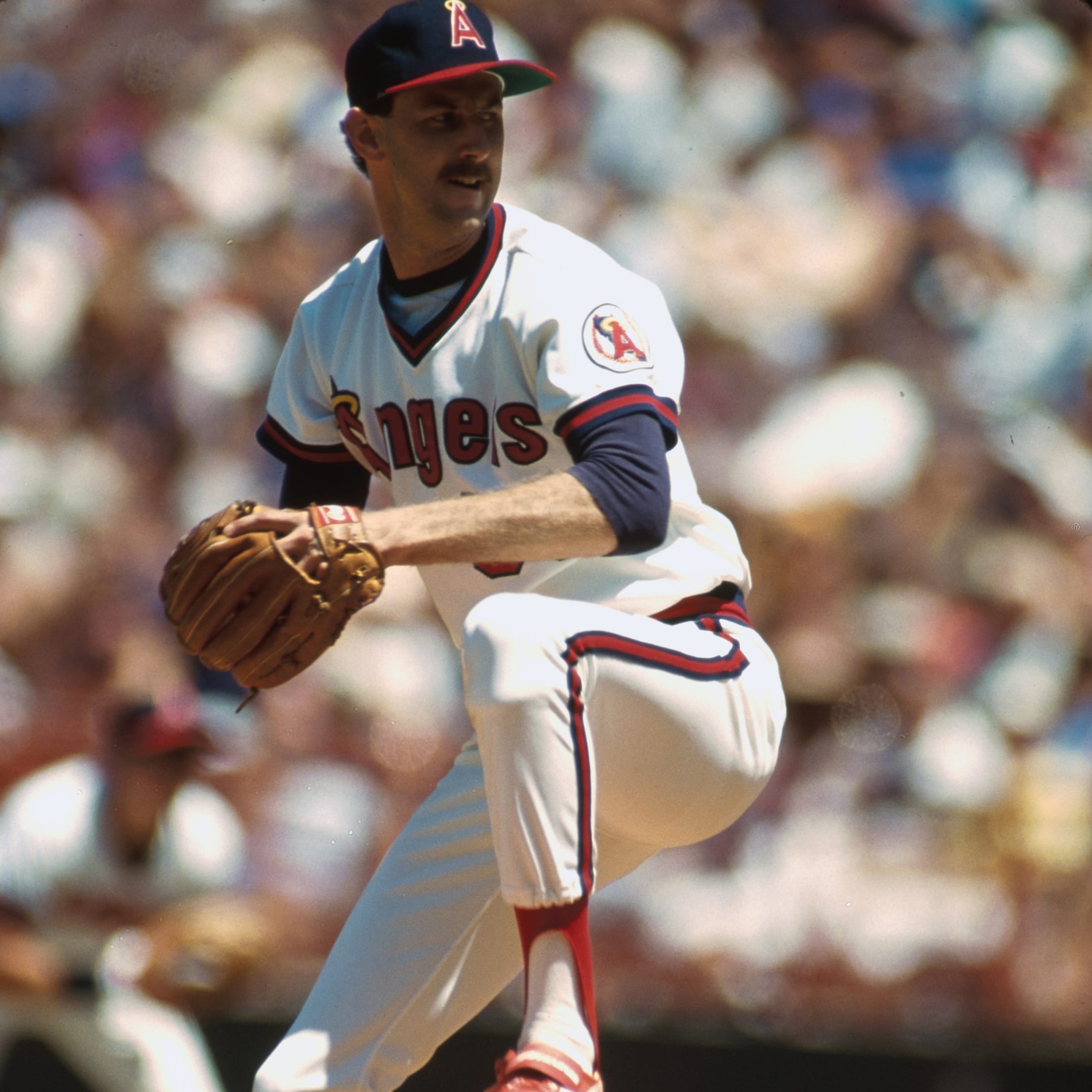
A decade-long (1981-90) Angels mainstay, local product (Servite HS) Mike Witt stands tall as one of the most dominant pitchers in Club history. At time of his Angels Hall of Fame induction (2015), the two-time All-Star ranked fourth on the Club's all-time list in wins (109), starts (272) & strikeouts (1,283) and third in complete games (70) & innings pitched (1,965.1).??? During his tenure, Witt was a member of two Western Division Champion teams (1982 & 1986). In 1986, he shouldered the Angels to the American League Championship Series with the best season of his career, posting a record of 18-10 with a 2.84 ERA. 5Witt's most impressive accomplishment came on the last game of the 1984 season (Sept. 30 at Texas) when he became one of only 13 pitchers in history to throw a perfect game, striking out 10 en route to a 1-0 victory.
Tim Salmon, OF

Affectionately tabbed as "Mr. Angel" and "The Kingfish," Tim Salmon spent his entire 15-year career in a Halo uniform. In 2002, he helped guide the Angels to their first World Championship. Salmon finished with a .282 career average and was inducted into the Club's Hall of Fame in 2015 as the career leader in home runs (299) & walks (970). He ranked second in team history in games (1,672), at-bats (5,934), runs (986), hits (1,674), extra base hits (662) and RBI (1,016). Salmon, originally selected in the third round of the 1989 MLB draft, made his Major League debut in 1992. The following campaign, the slugger earned the nod as the A.L. Rookie of the Year batting .283 with an Angels' rookie-record 31 home runs and 95 RBI. Salmon's best season came in 1995 when he posted a slash line of .330/.429/.524 and captured a Silver Slugger Award?. The Kingfish was an integral part of the Halos' World Series crown in 2002, guiding the Club to the playoffs for the first time since 1986. Salmon hit two key home runs in Game 2 of the Fall Classic against San Francisco and batted .346 with a 1.067 OPS in the Series overall. That season, he was also tabbed as The Sporting News Comeback Player of the Year as he posted a .286 clip with 48 extra-base hits and 88 RBI. Salmon played his final game on Oct. 1, 2006, against the Oakland Athletics and exited to a standing ovation from the Halo faithful.
Dean Chance, P
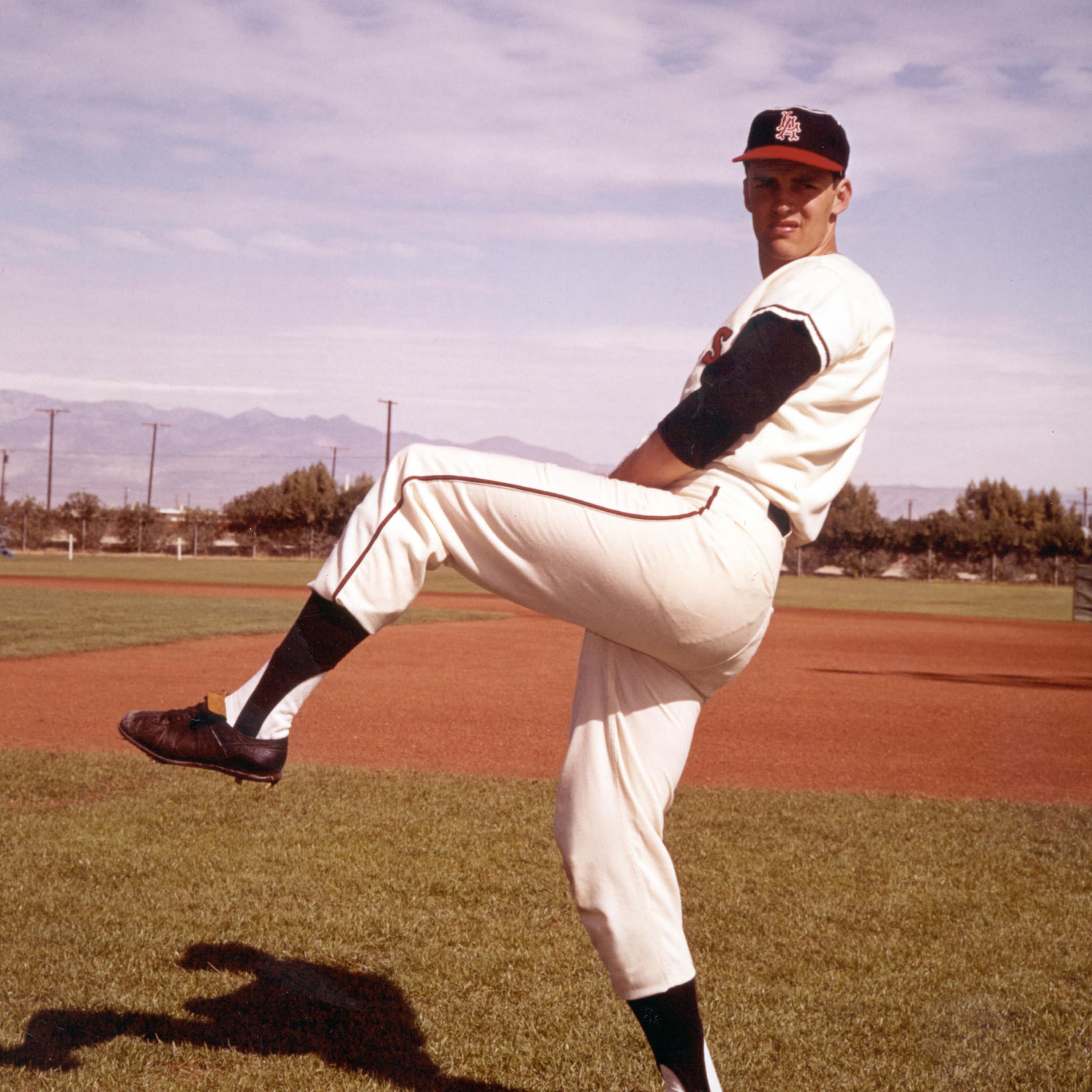
One of the initial aces in team history, Dean Chance was inducted into the Angels Hall of Fame in 2015. Sadly, Chance passed away on Oct. 11, 2015 - just a few months after his induction. In 1964, he became the Halos' first 20-game winner and Cy Young Award? recipient. At the time, he was the youngest recipient of the hardware. During the 1964 campaign, Chance led the A.L. in wins (20), ERA (1.65) & innings pitched (278.1) while tossing 11 shutouts, including six by a 1-0 score. He also notched 207 punchouts, and allowed just a 1.01 WHIP. His 1.65 ERA stands as the Halos' single-season record by a starting pitcher. Additionally in 1964, Chance threw four complete games (3 SHO) against the New York Yankees. Not only did Chance post a 4-0 mark vs. Yankees, he allowed just one run in 50 IP (0.18 ERA), a home run to Mickey Mantle. The feat easily ranks among the top dominant season pitching performances over one team in baseball history. Over the course of six years with the Club, Chance posted a 74-66 record, 2.86 ERA (1131 IP - 360 ER) and 857 strikeouts. His career ERA remains the best all-time in Club history.
Bobby Knoop, 2B

Bobby Knoop, one of the original Angel stars during the team's first decade of existence, was inducted on Sept. 5, 2013. The infielder was a four-time recipient of the Owner's Trophy (1964-66 & 1968), presented annually to the Club's MVP. He is one of just three Halos to win the award at least four times (Garret Anderson & Mike Trout). The second baseman played six seasons with the Halos (1964-69) and combined with Jim Fregosi to form one of the most formidable double-play tandems in all of MLB. The duo claimed Rawlings Gold Gloves? in 1967, the second of three such honors for Knoop. Knoop's best offensive season came in 1966 when he posted career-highs in home runs (17), RBI (72) runs (54) and triples (11). His 11 triples led the A.L. and he was named as an All-Star Game starter that season. Originally signed by the Milwaukee Braves as an amateur free agent before the 1956 season, he was a Rule 5 Draft pick by the Angels from the Braves on Dec. 2, 1963. In his first season with the Angels in 1964, he played in all 162 games.
2002 World Champion Angels

The 2002 World Champion Angels were inducted into the Angels Hall of Fame on Aug. 18, 2012.
En route to capturing the franchise's first World Series title, the 2002 Angels finished with a 99-63 record during the regular season to claim the American League Wild Card and advance to the postseason for the first time since 1986. The offense was paced by team MVP Garret Anderson (.306, 56 2B, 29 HR, 123 RBI), A.L. Comeback Player of the Year Tim Salmon (.286, 22 HR, 88 RBI), Troy Glaus (30 HR, 111 RBI), Darin Erstad (.283, 99 runs, 23 SB) and leadoff man David Eckstein (.293, 107 runs, 21 SB). On the mound, the starting staff featured Jarrod Washburn (18 wins), Kevin Appier (14 wins), Ramon Ortiz (15 wins) and rookie John Lackey (9 wins). The bullpen was guided by the likes of Troy Percival (40 saves), Brendan Donnelly (2.17 ERA), Ben Weber (2.54 ERA) and late season call-up Francisco Rodriguez. The pitching staff was guided by Gold Glove? catcher Bengie Molina.
The All-California World Series matched the Angels with the San Francisco Giants in the 99th edition of the Fall Classic. After the Giants took a 3-2 series lead, the stage was set for one of the more remarkable comebacks in playoff history. In Game 6, the Halos trailed 5-0 with seven outs left in their season until Spiezio's three-run home run brought the Club back into the game. An inning later, the Halos rallied for three more runs, keyed by Glaus' two-run double. The Angels' 6-5 comeback win was the biggest ever by a team facing series elimination.
42 years of waiting for a World Series crown came to a climactic close for Angels' fans on Sunday, Oct. 27, 2002. The Game 7 win was highlighted by Anderson's clutch bases clearing, three-run double in the third inning. Lackey received the win, becoming just the second rookie pitcher to win Game 7 of the World Series. Glaus was named MVP of the 2002 Fall Classic after hitting .385 (10/26) with seven runs, three doubles, three home runs and eight RBI.
Gene Autry, Owner

Retired Number - #26
Gene Autry, the man responsible for bringing an expansion franchise to the American League and Southern California region in December 1960, was inducted into the Angels Hall of Fame on July 19, 2011.??The "Singing Cowboy," who passed away Oct. 2, 1998 at the age of 91, was one of the most popular owners in Major League history. His love for baseball and the respect and admiration he had for those who played, coached and managed the game has been well documented. Among the many hundreds of honors and awards Autry received were induction into the Country Music Hall of Fame; the American Academy of Achievement Award; the Los Angeles Area Governor's Emmy from The Academy of Television Arts & Sciences; and the Board of Directors Lifetime Achievement Award from the International Achievement in Arts Foundation. Gene Autry was also inducted into the Nashville Songwriters Hall of Fame, The National Cowboy Hall of Fame, the National Association of Broadcasters Hall of Fame, and he received The Songwriters Guild Life Achievement Award. He was also honored by his songwriting peers with a lifetime achievement award from ASCAP. Perhaps his greatest honor was the retirement of uniform No. 26, symbolic of the 26th player on the Angels roster, a gesture initiated by members of the 1982 team.
Chuck Finley, P

Chuck Finley, the Angels' all-time leader in wins with 165, was inducted into the Club's Hall of Fame on Aug. 27, 2009. The four-time All-Star was originally drafted by the Halos in the first round (fourth overall pick) in the 1985 draft. He saw his first big league action the following season, joining the club for their memorable 1986 Western Division title run. The West Monroe, LA native's career spanned 17 seasons in which he compiled a 200-173 record and a 3.85 ERA in 524 games. On the date of his induction, he topped the Angels all-time list with 165 wins, 379 starts and 2,675 innings pitched while finishing second behind Nolan Ryan with 2,151 strikeouts and fourth with 57 complete games. In a dominating three-year period from 1989-91, Finley posted a 52-27 record with a 2.93 ERA in 95 starts. In 1990, he enjoyed a career-year in which he took home the Owner's Trophy, going 18-9 with a 2.40 ERA, the third-lowest single season ERA in club history. When he retired in 2002, Finley was one of only 25 pitchers in Major League history to record over 2,500 strikeouts.
Brian Downing, C, DH, OF

Brian Downing, who served 13 years in an Angel uniform, left the club as the all-time leader in almost every major offensive category. He is one of only two Angels (Bobby Grich being the other) to participate in each of the club's first three Western Division titles. He was inducted into the Angels Hall of Fame on Aug. 27, 2009. Downing was originally acquired by California, Dec. 5, 1977, along with Dave Frost and Chris Knapp from the White Sox in exchange for Bobby Bonds, Thad Bosley and Richard Dotson. The Anaheim, CA native helped lead the Angels to their first Western Division title in 1979 batting a career-high .326 with 12 home runs and 75 RBI. His stellar performance earned him an All-Star selection. During his 20-year career, Downing registered a .267 average in 2,344 games with 2,099 hits, 1,188 runs, 275 home runs and 1,073 RBI. After 13 seasons, Downing topped many Angels' all-time lists with 1,661 games, 5,854 at-bats, 889 runs, 1,588 hits, 2,580 total bases, 282 doubles, 222 home runs, 846 runs batted in and 866 walks.
Jimmie Reese, Coach

Retired Number - #50
Jimmie Reese, whose 23 years in an Angels uniform is second longest in Club history (Bobby Knoop - 24), was inducted on Aug. 2, 1995. A former roommate of Babe Ruth, Reese began his career as a batboy for the Los Angeles Angels of the Pacific Coast League in 1917. He broke into baseball seven years later as a second baseman for the minor league Oakland Oaks. Reese played one more year in the majors (1932 with St. Louis) before returning to the Pacific Coast League in 1933. In three Major League seasons, he hit .278, including a .345 mark in a reserve role for the Yankees in 1930. Reese played 12 seasons in the PCL (Oakland, 1924-29; Los Angeles, 1933-36 and San Diego, 1937-38) and was honored as all-time second baseman of the league. He set a career fielding record for total chances with 9,890 and led the PCL in fielding three times (1927, 1929 & 1934). On Mar. 30, 1972, Reese joined the Angels coaching staff. During his 23 years, he built a reputation for being the most prolific fungo hitter in baseball. In 1989, Reese was selected by the late Commissioner Bart Giamatti to throw out the ceremonial first pitch for the 60th All-Star Game at Anaheim Stadium. In 1992, he was named honorary captain of the American League All-Stars at the contest in San Diego. Jimmie Reese passed away on July 13, 1994 at the age of 92.
Nolan Ryan, P

Retired Number - #30
Nolan Ryan, who became the 20th pitcher in Major League history to win 300 games (July 31, 1990 at Milwaukee) and owns a Major League record seven no-hitters and 5,714 strikeouts, was inducted and had his uniform No. 30 retired, June 16, 1992. Ryan appeared with the Angels from 1972-79, compiling a 138-121 record and 3.06 ERA in 291 games. Ryan tossed four of his no-hitters with the Halos and holds or shares several Club records, including complete games (156), shutouts (40) and strikeouts (2,416). In 1977, he was selected "A.L. Pitcher of the Year" by The Sporting News and named to its All-Star team. In 1973, Ryan established a Major League record for strikeouts in a single season with 383. He was originally acquired by the Angels from the New York Mets, Dec. 10, 1971, along with pitcher Don Rose, outfielder Leroy Stanton and catcher Francisco Estrada in exchange for Jim Fregosi. Ryan's career spanned 27 seasons, the most in Major League history. Ryan was named to eight All-Star teams (five with Angels) and appeared in five games, including as starting pitcher for the American League in 1979 in Seattle. He pitched two scoreless relief innings to win the 1989 game in Anaheim, becoming the oldest pitcher to win an All-Star Game. Ryan was inducted into the Baseball Hall of Fame, July 25, 1999.
Rod Carew, INF

Retired Number - #29
Rod Carew was the 16th player in Major League history to collect 3,000 hits (Aug. 4, 1985 vs. Minnesota). He was inducted into the Angels Hall of Fame, Aug. 6, 1991 and the Baseball Hall of Fame in Cooperstown, NY, July 21, 1991. Carew appeared with the Angels from 1979-85 and was a key member of the Club's first two Western Division titles in 1979 and 1982. His finest came in 1983, when he established a then club record for batting average at .339. Carew's career spanned 19 Major League seasons, the first 12 with Minnesota. He won seven batting titles (1969, 1972-75, 1977-78) and the American League Most Valuable Player Award in 1977 when he hit .388 with 239 hits and 128 runs scored. Carew was named "Rookie of the Year" by the BBWAA in 1967 and selected to the A.L. All-Star team 18 times (1967-84). He became the first Angel to start in five Midsummer Classics. Originally acquired by the Angels from Minnesota, Feb. 3, 1979, Carew ranked 38th on baseball's all-time lists in average (.328), tied for 35th in games (2,469), 31st in at-bats (9,315), 13th in hits (3,053) and sixth in singles (2,404) at the time of his induction. On the Angels' All-Time lists, he still ranks second in career average (.314).
Don Baylor, DH
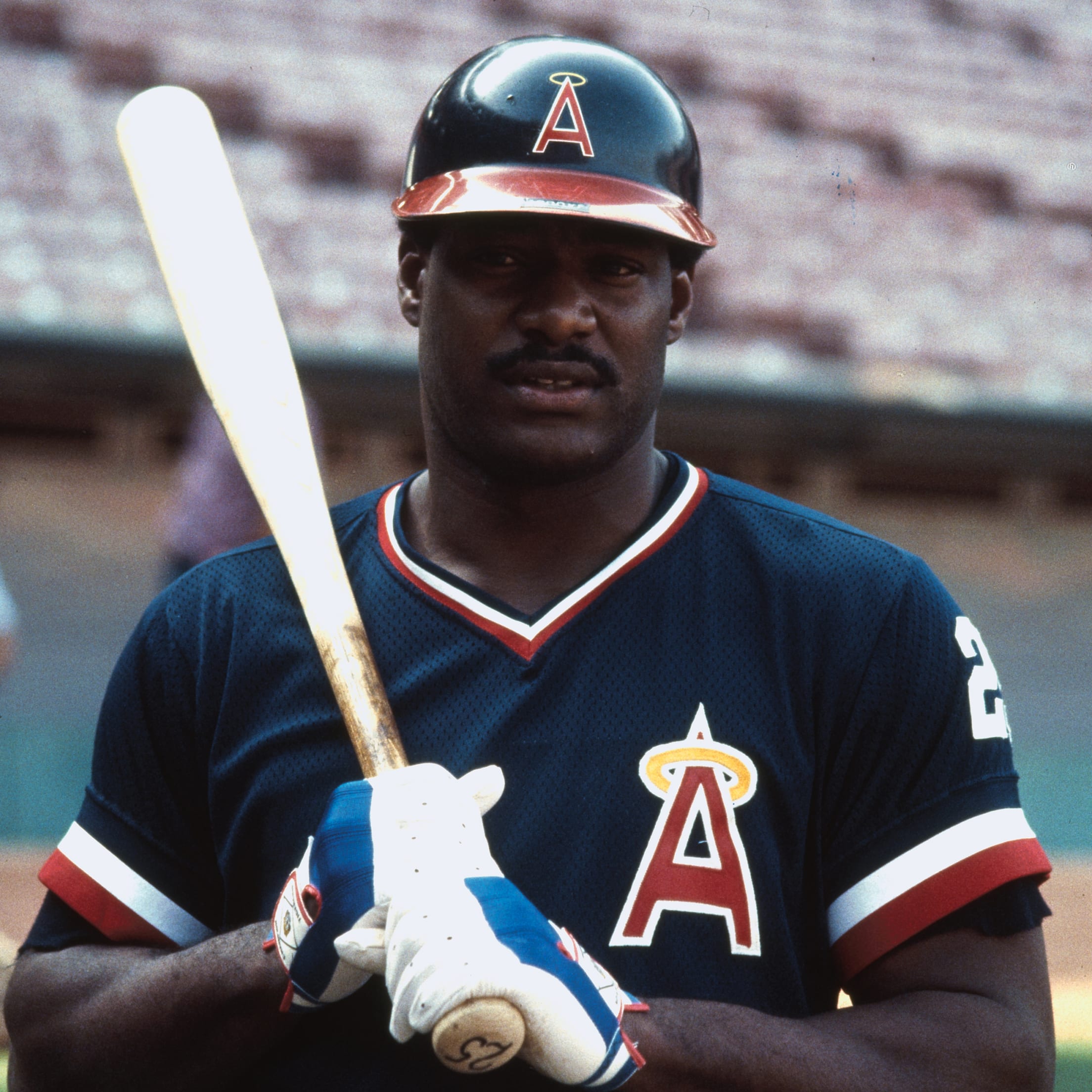
Don Baylor, the first Angel to win the American League Most Valuable Player Award in 1979, was inducted on May 26, 1990. He appeared with the Angels from 1977-82. He was a member of the Angels first two Western Division Championships in 1979 and 1982. During his MVP season, Baylor compiled a .296 average with 36 home runs and a league-leading 139 RBI. He also led the league in games played (162) and runs scored (120). His marks in games played, runs scored, RBI and total bases set Club single-season records. In the 1982 American League Championship Series, he hit .294 with a grand slam and series-high 10 RBI. Baylor's career spanned 19 Major League seasons during which he registered a .260 average and 338 home runs. He was originally acquired by the Angels Nov. 16, 1976 as a free agent. With the Halos, he averaged 23 home runs and 87 RBI, while batting .262 in six seasons. Upon his induction, Baylor ranked on Angels all-time list in the following categories: third in home runs (141), fourth in at-bats (3,105), runs (481), RBI (523) and total bases (1,390). In addition, he also ranked fifth in extra base hits (288), hits (813), doubles (140, tied with Carew) and stolen bases (89).
Jim Fregosi, 1B
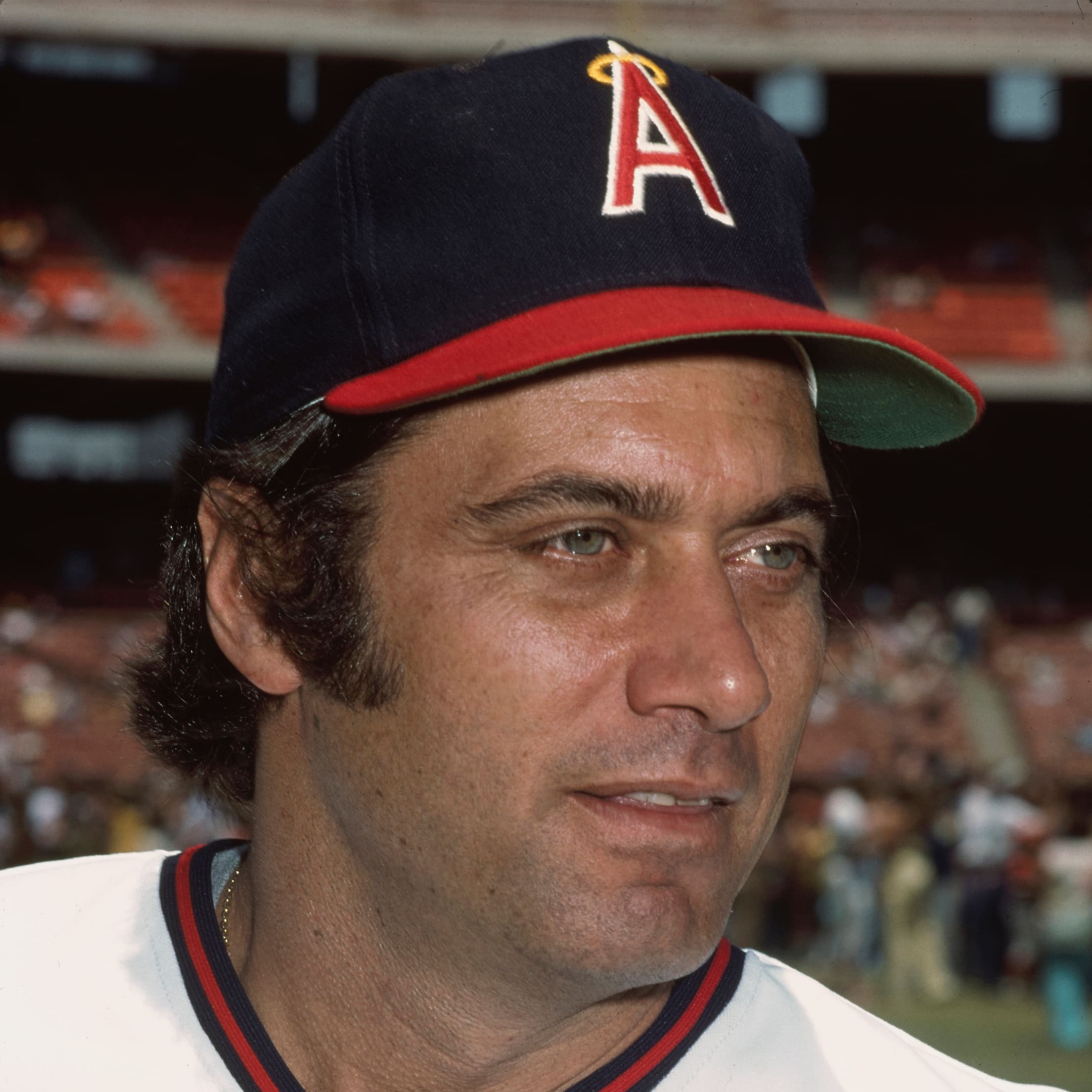
Retired Number - #11
Jim Fregosi, a six-time Angels All-Star, was inducted May 17, 1989. He appeared with the Halos from 1961-71 as a player and then managed the Club from June 1, 1978 through May 28, 1981. Fregosi guided the Angels to an 87-75 finish in 1978 and a second place tie prior to the memorable 1979 season when the Club captured their first-ever Western Division title. For his efforts, Fregosi was runner-up in balloting by the Associated Press for A.L. Manager of the Year. He finished with a 237-248 record managing the Angels. As a player, Fregosi's career spanned 18 seasons during which he registered a .265 lifetime average. He was originally acquired by the Angels Dec. 14, 1960 in the expansion draft from the Boston Red Sox. Fregosi was voted the winner of the Angels Owner's Trophy three times and was a Gold Glove? recipient in 1967. At the time of his induction, Fregosi led on the Angels all-time lists in the following categories: games (1,429), at-bats (5,244), hits (1,408) and triples (70). In addition, he ranked second in runs (691), doubles (219), extra-base hits (404) and total bases (2,112).
Bobby Grich, 2B
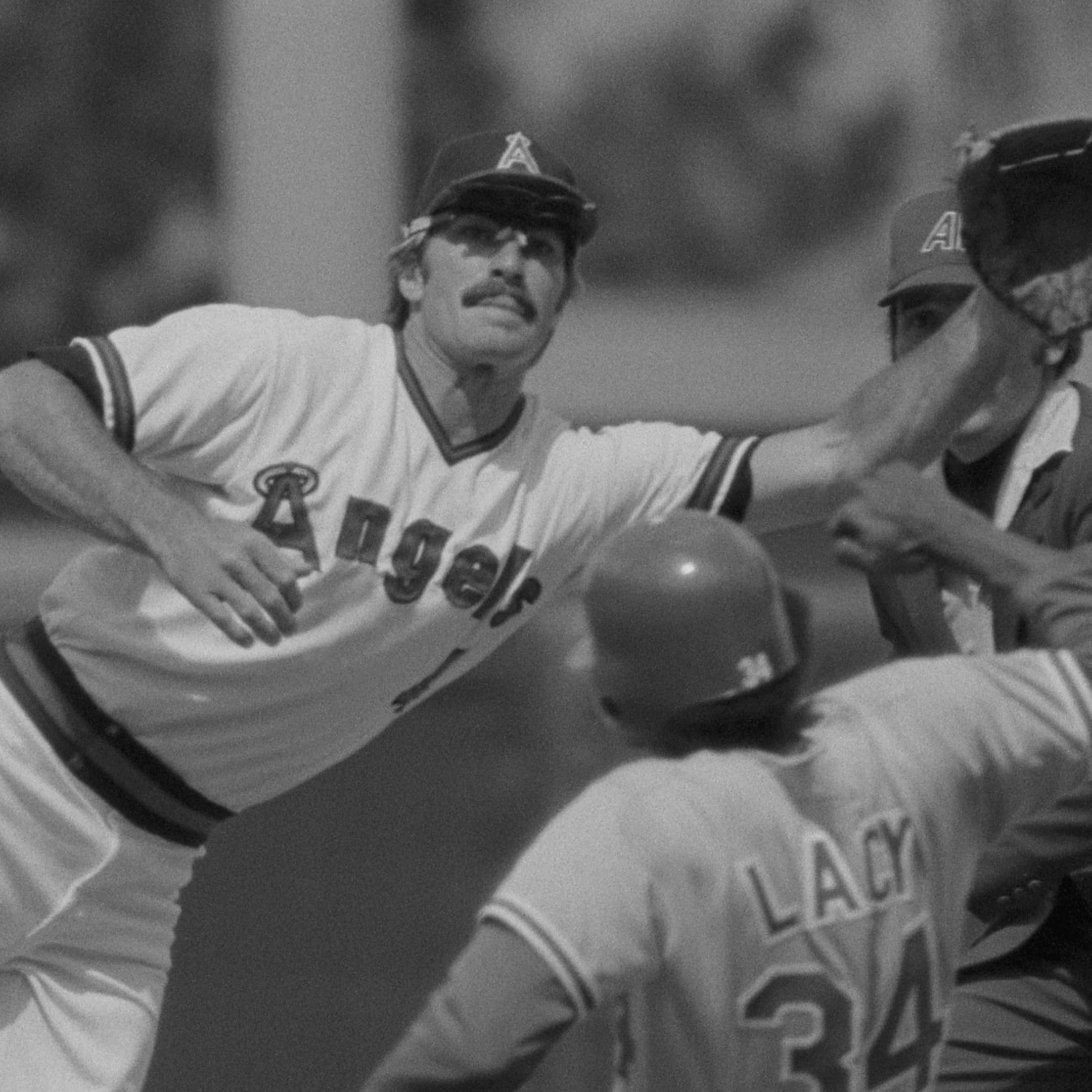
Bobby Grich, who retired following the American League Championship Series against Boston in 1986, was inducted Feb. 3, 1988. He is one of only two Angels (Brian Downing) to participate in each of the Club's first three Western Division titles. Grich officially became an Angel Nov. 24, 1976. The native of Muskegon, MI concluded his Angels career with a .269 average in 1,222 games including 154 home runs and 557 RBI. During his career, Grich compiled the following overall numbers: .266 average, 2,008 games, 6,890 at-bats, 1,033 runs, 1,833 hits, 224 home runs and 864 RBI. Grich's .997 fielding percentage in 1985 established a Major League record for second basemen. On the date of his induction, Grich ranked among the top three on several Angels all-time lists, including games (3rd), at-bats (3rd, 4,100), runs (3rd, 601), home runs (2nd), runs batted in (2nd), extra-base hits (3rd, 357), hits (3rd, 1,103), doubles (3rd, 183) and total bases (3rd, 1,788).
OTHER RETIRED NUMBERS
Jackie Robinson, 2B
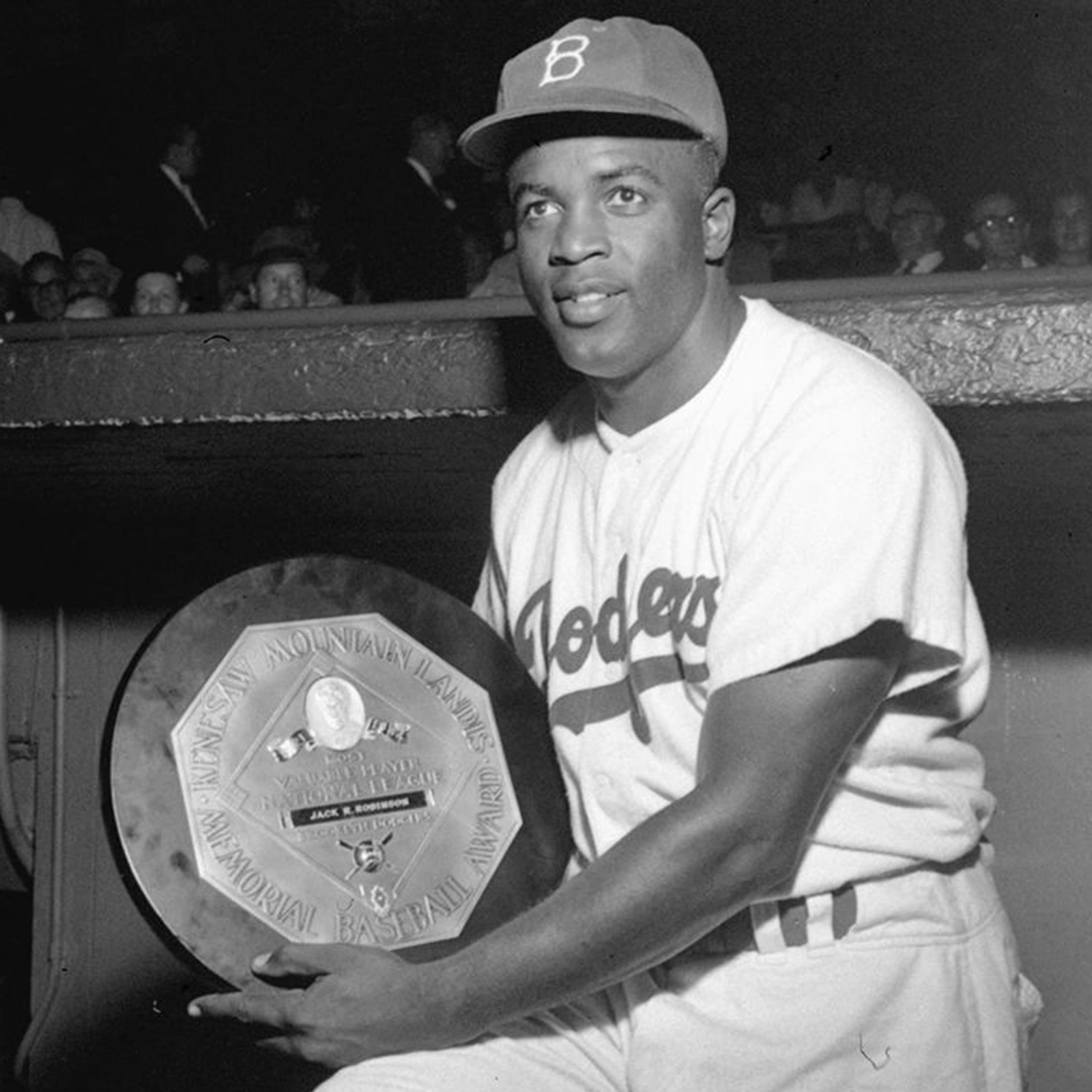
Retired Number - #42
Although Jackie Robinson did not play for the club, the Angels recognize Robinson's impact on Major League Baseball with the retirement of his number, 42. Robinson became the first African-American player in the 20th century to take the field in the big leagues. His contributions to the game have helped open the door for many others as his legacy continues to live on. Robinson was inducted into the Baseball Hall of Fame in 1962, and in 1997, MLB retired his uniform number across all teams. On April 15th each season, every MLB team celebrates Jackie Robinson Day in honor of his accomplishments.
NATIONAL BASEBALL HALL OF FAMERS
Years with Angels
Vladimir Guerrero, OF
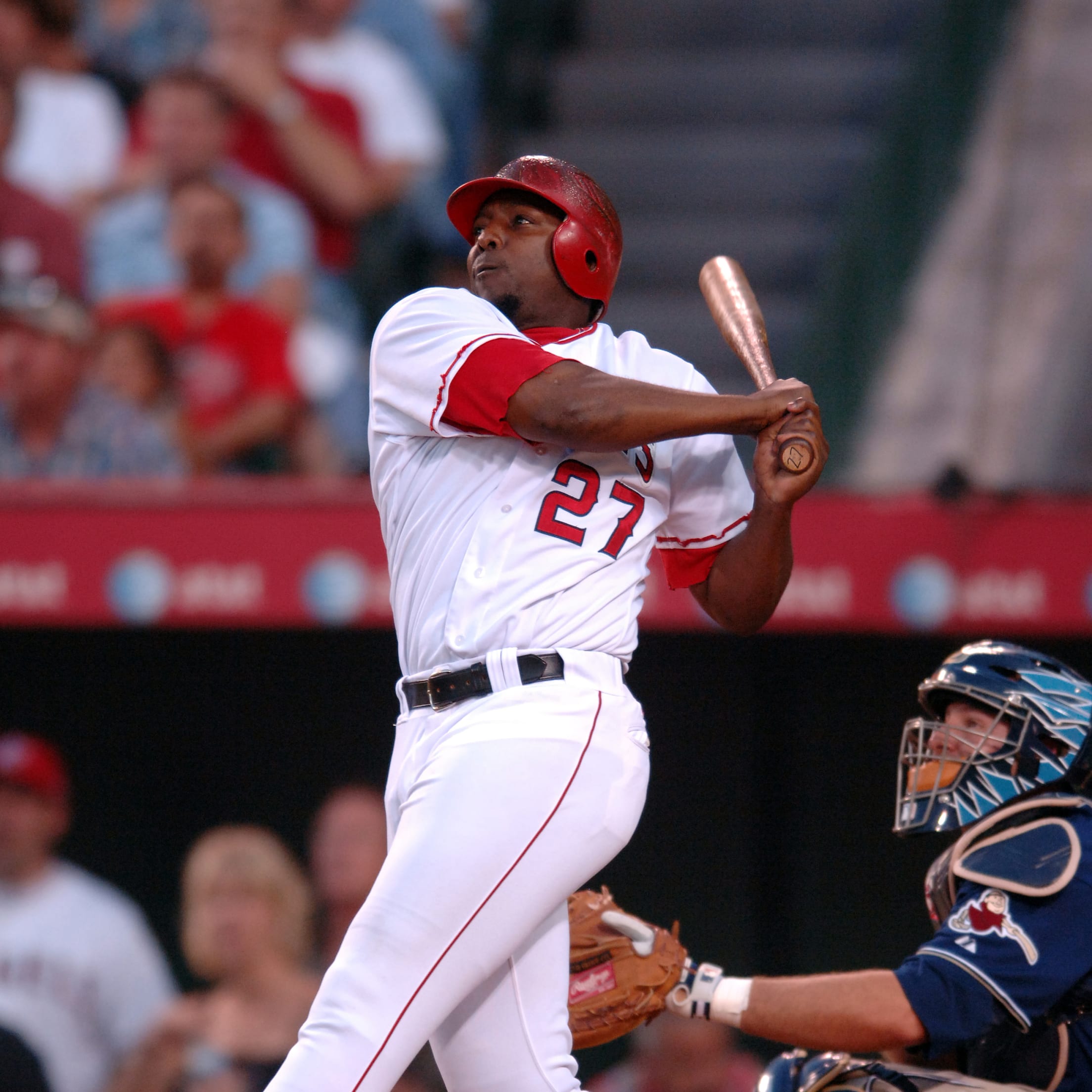
Vladimir Guerrero signed with the Angels as a free agent following the 2003 season. In 2004, Guerrero won the American League Most Valuable Player Award after hitting 39 home runs, driving in 126 runs and leading the AL in runs scored (124) and total bases (366). He never struck out more than 95 times in any season. Guerrero retired following the 2011 season with a .318 career batting average, 449 home runs, 1,496 RBI and 2,590 hits. He was named to nine All-Star Games, won eight Silver Slugger Awards and led his league in assists twice as an outfielder. Guerrero is the first electee to have an Angels logo on his Hall of Fame plaque.
Rod Carew, INF
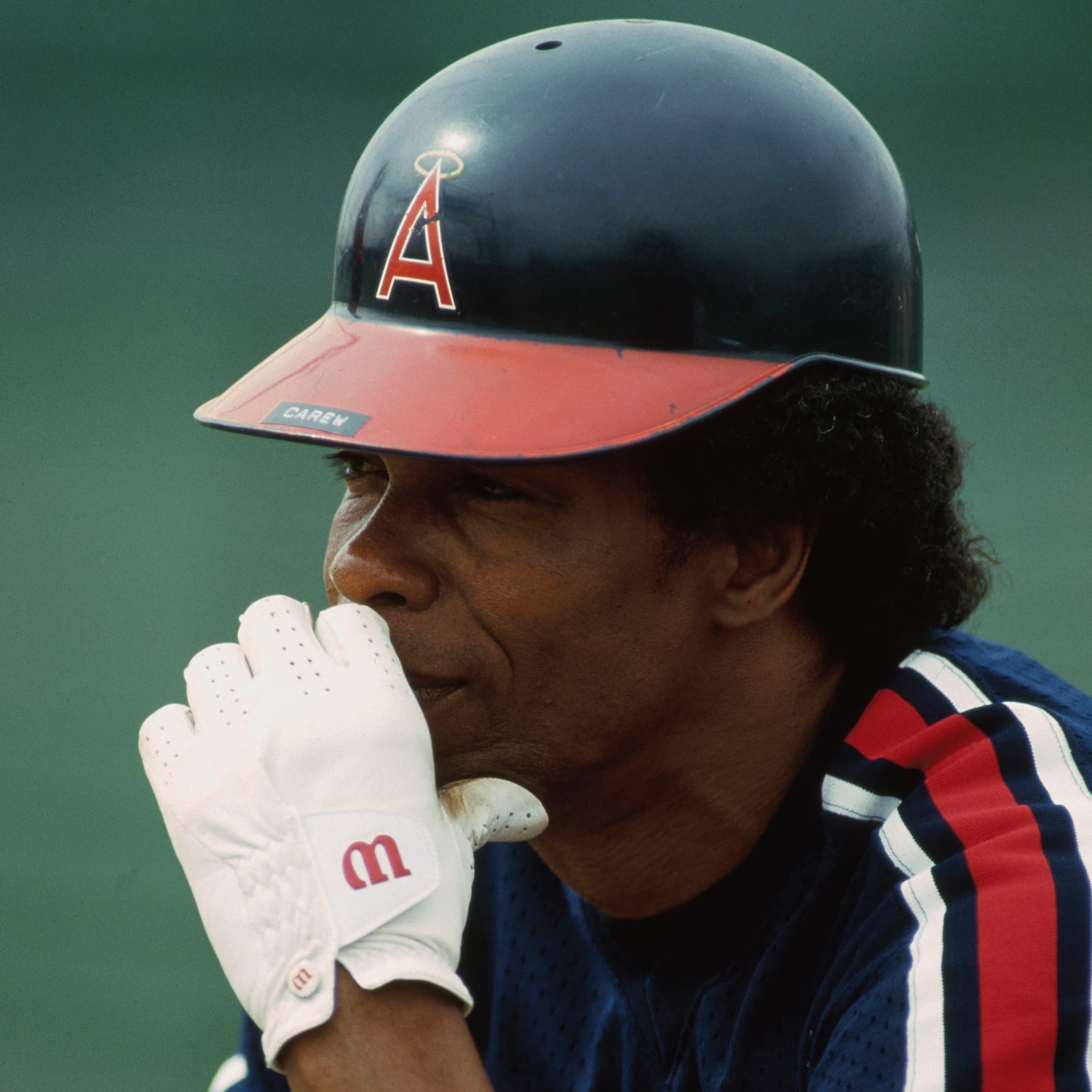
Rod Carew was the 16th player in major league history to collect 3,000 hits (Aug. 4, 1985 vs. Minnesota). During his professional career, Carew appeared with the Angels from 1979-85. He was a member of California's first two Western Division Championship teams in 1979 and 1982. His finest season was 1983, when he established a then club record for batting average at .339. He was inducted into the Baseball Hall of Fame in Cooperstown, NY, July 21, 1991.
Bert Blyleven, P
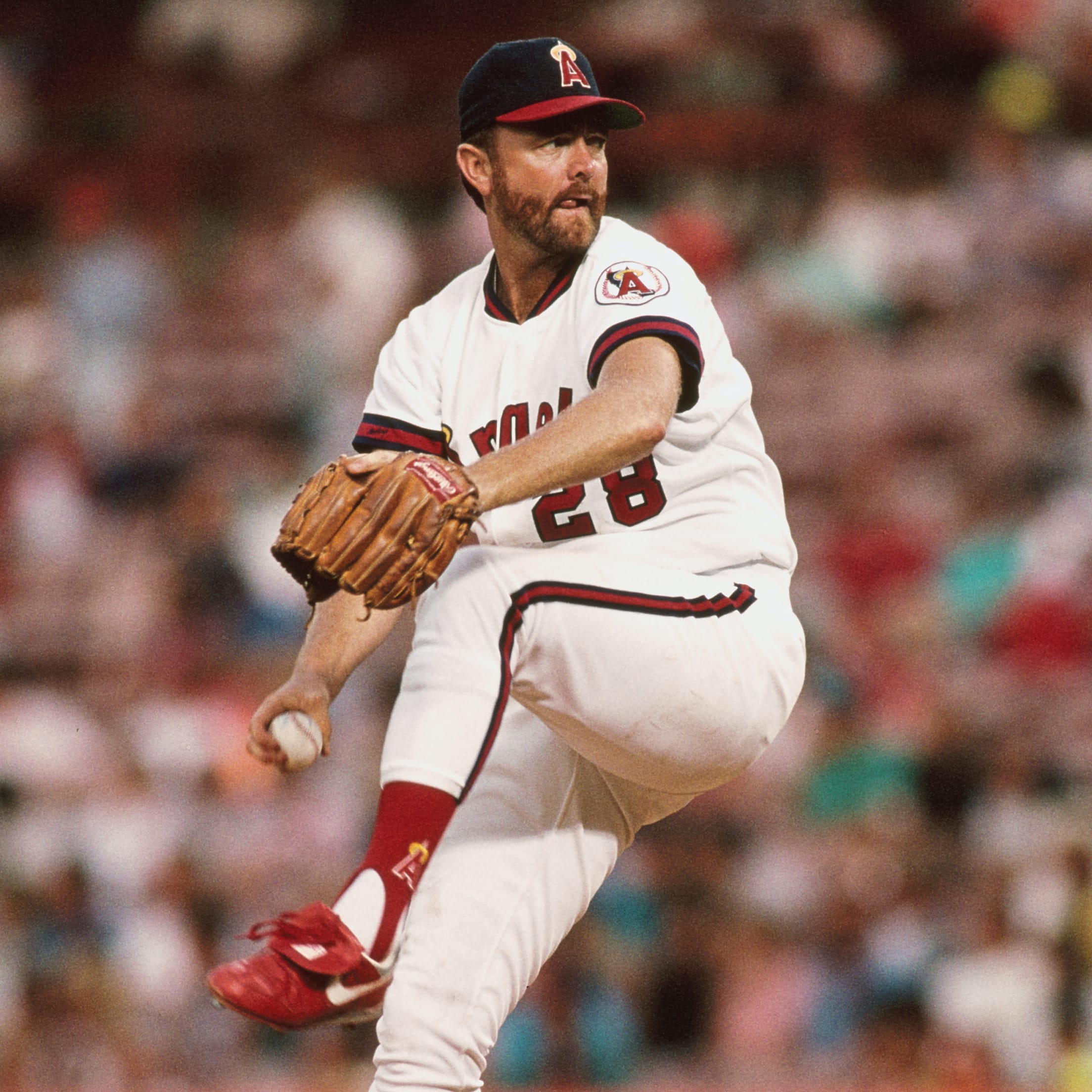
Bert Blyleven went to the Angels at the age of 38, playing for the team from 1989-1990 and 1992. In his first season with the Angels, Blyleven went 17-5, leading the team in wins that year, with an ERA of 2.73. He also led the team in shutouts during the same season, having thrown 5 shutouts. Blyleven went on to receive the A.L. Comeback Player of the Year Award following his noteworthy performance. He is tied with Matt Shoemaker for longest streak in Angels history of consecutive starts with no walks (4, Apr. 9-27, 1990). He retired in 1992 after 22 seasons, and was inducted into Cooperstown in 2011.
Rickey Henderson, OF
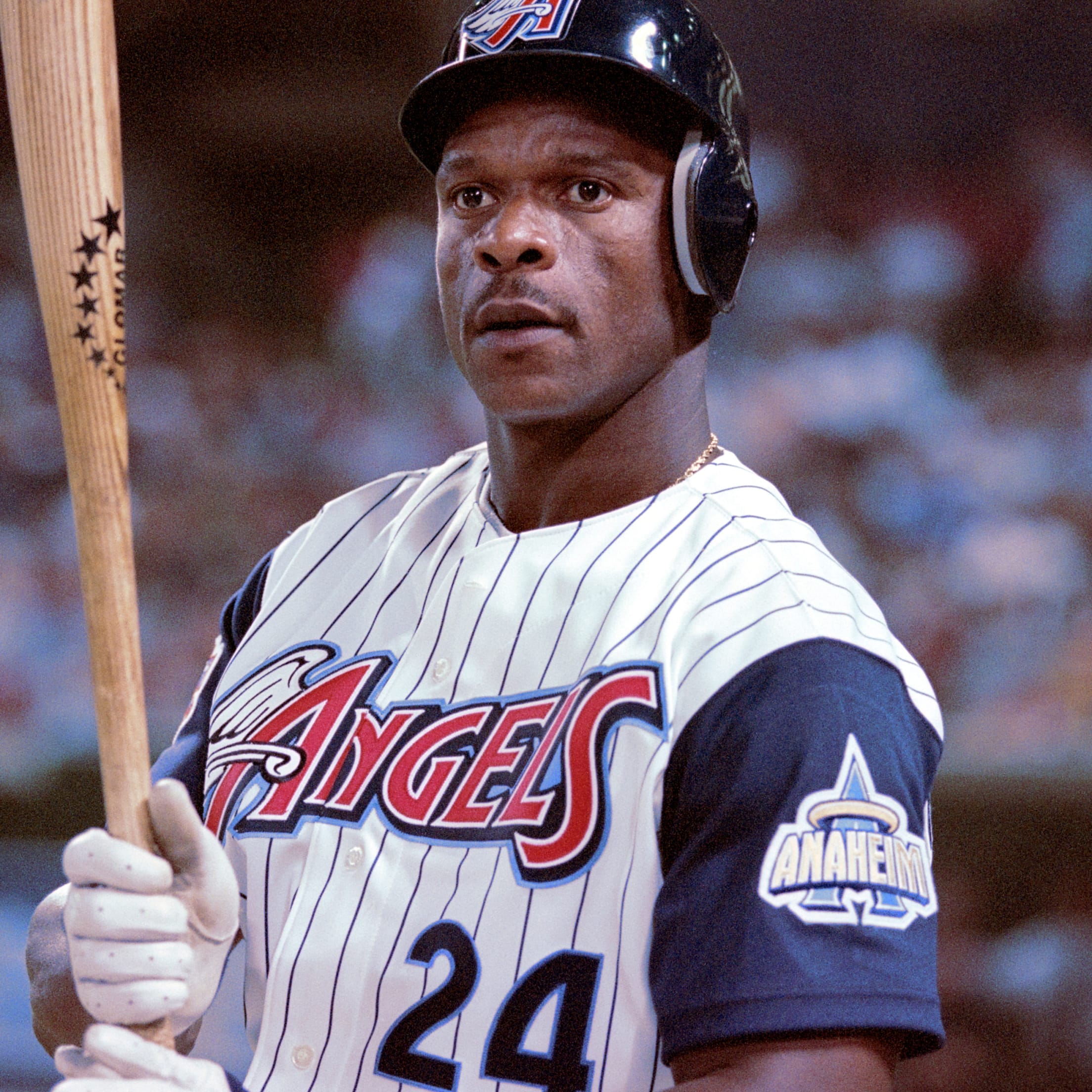
Rickey Henderson was acquired by the Angels in 1997. He was a 10-time All-Star, MVP award winner, and set multiple all-time records, including most leadoff homeruns (81), runs scored (2,295), and unintentional walks (2,129). He scored his 1,500th career run in age 34 or younger season - and is only 1 of 11 to do so. Henderson and Mike Trout are the only two players in Major League history to hit .350 or above with 15+ homeruns and 30 or more stolen bases before August 1st. His successful career spanned 24 years, and he was elected to the Baseball Hall of Fame in 2009 on his first ballot appearance.
Reggie Jackson, OF
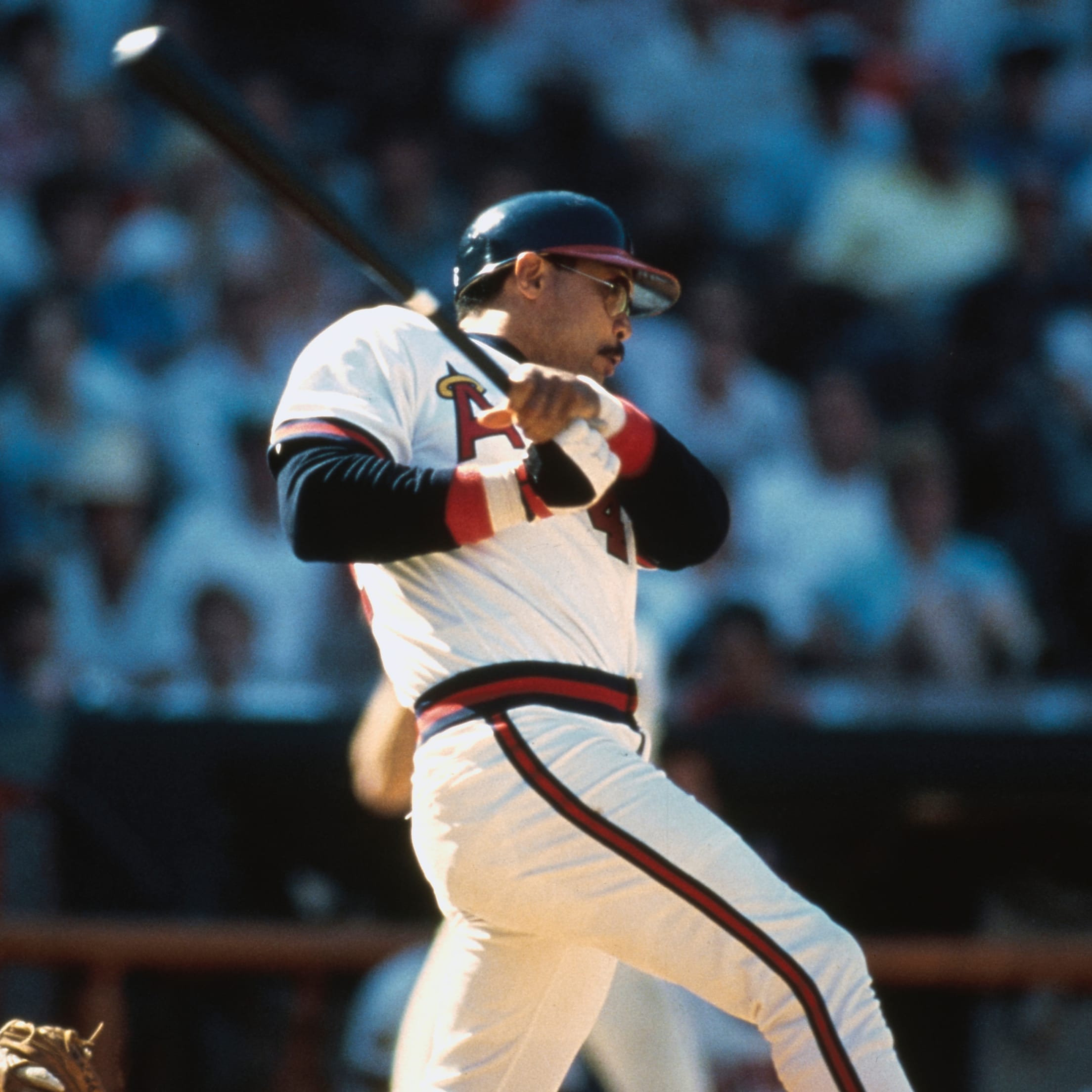
Reggie Jackson played with the Angels from 1982-86. In his first season with the Halos, Jackson led the league in home runs and still holds the Angels record for most home runs in a season by a left-handed batter (39). Also in his initial season with the team, the club boasted four former American League MVPs in the lineup, including Don Baylor, Rod Carew, Jackson, and Fred Lynn. He was selected as an All-Star twice during his tenure with the team. Jackson is one of 18 players to connect for 100 home runs or more in an Angels uniform, placing 12th on the list with 123 home runs in his time with the team. Jackson hit his 500th career home run while in an Angels uniform, a feat that he reached on September 17, 1984. Jackson was inducted into the Hall of Fame in 1993.
Whitey Herzog, Manager
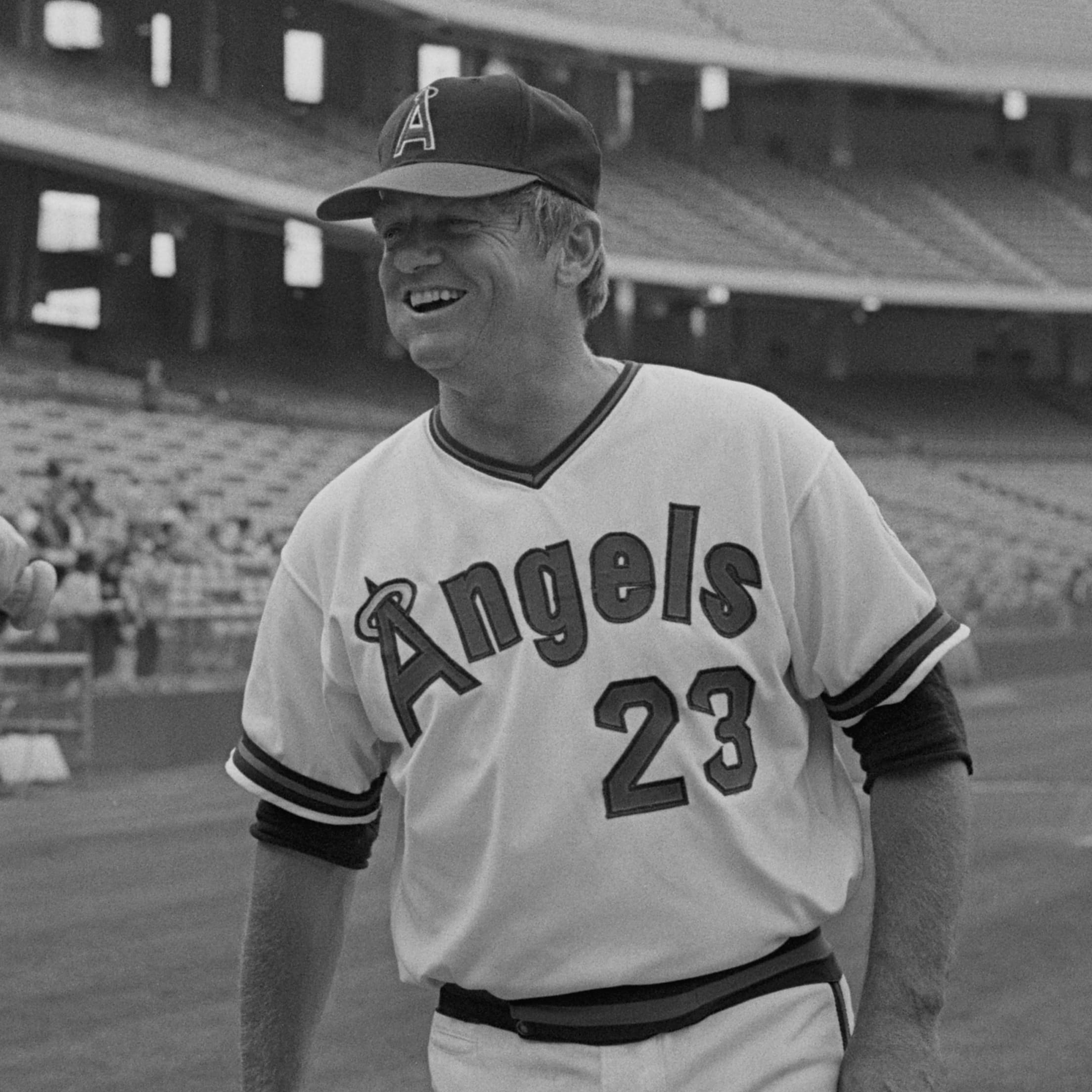
Whitey Herzog saw many positions during his career in baseball, including a player, scout, general manager, coach, and farm system director. His managerial skills earned him his enshrinement into the Hall of Fame in 2010, 20 years after retiring from the sport. Herzog was a coach with the Angels during the 1974 season, and was selected to the All-Star game as a coach that season. He finished his career with 1,281 wins out of 2,409 games, with a winning percentage of .532.
Eddie Murray, 1B
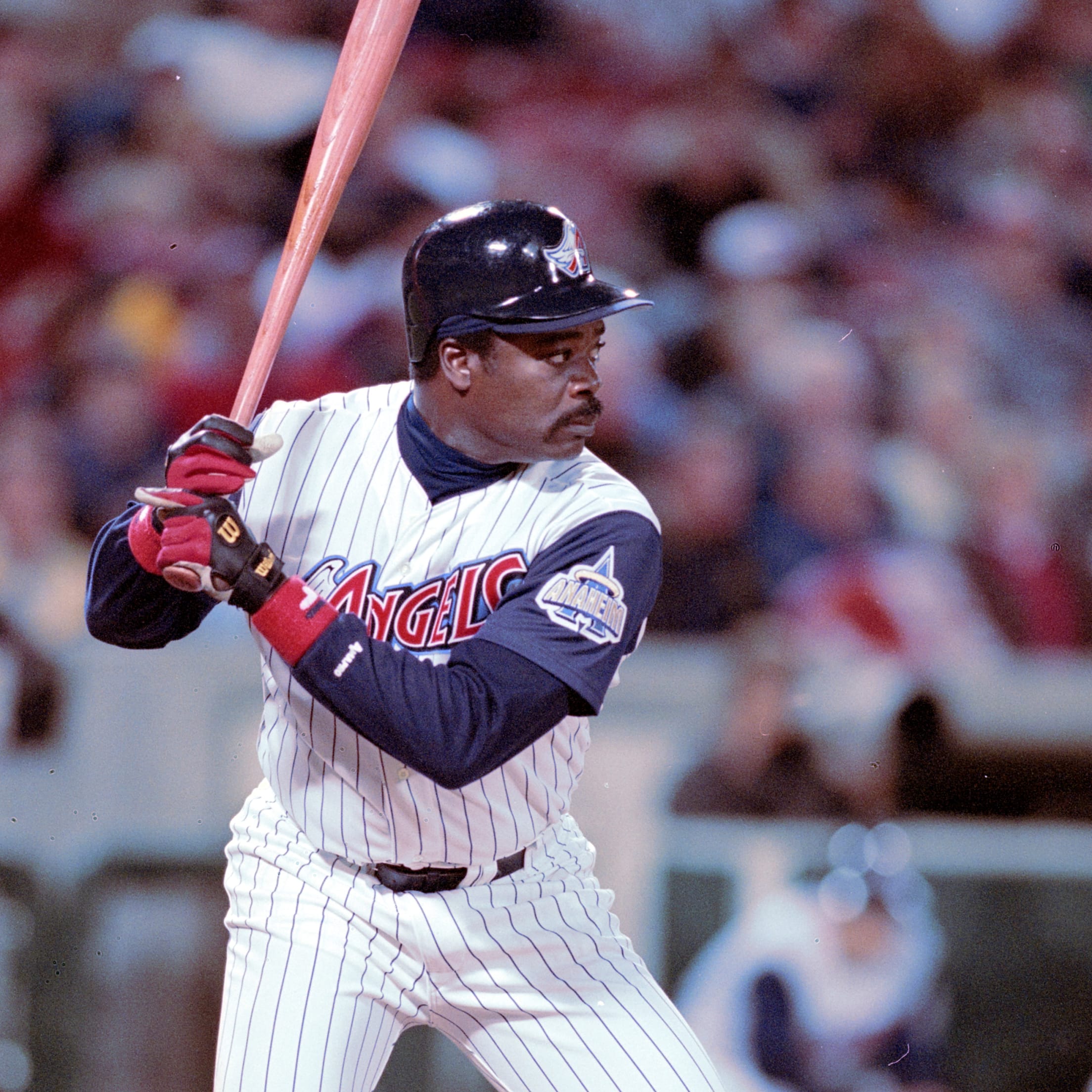
Eddie Murray appeared with the Angels in 1997, the last season of his career, as an infielder and designated hitter. Murray is one of 12 players with 500 home runs, 500 doubles, and 1,500 RBI. He was the third player in history, after Hank Aaron and Willie Mays, to record 3,000 hits and 500 home runs. Murray's career stats include 504 home runs, 1,917 RBI, 110 stolen bases, and 3,255 hits. No one has played more major league games at first base. Murray was inducted into Cooperstown in 2003.
Frank Robinson, OF
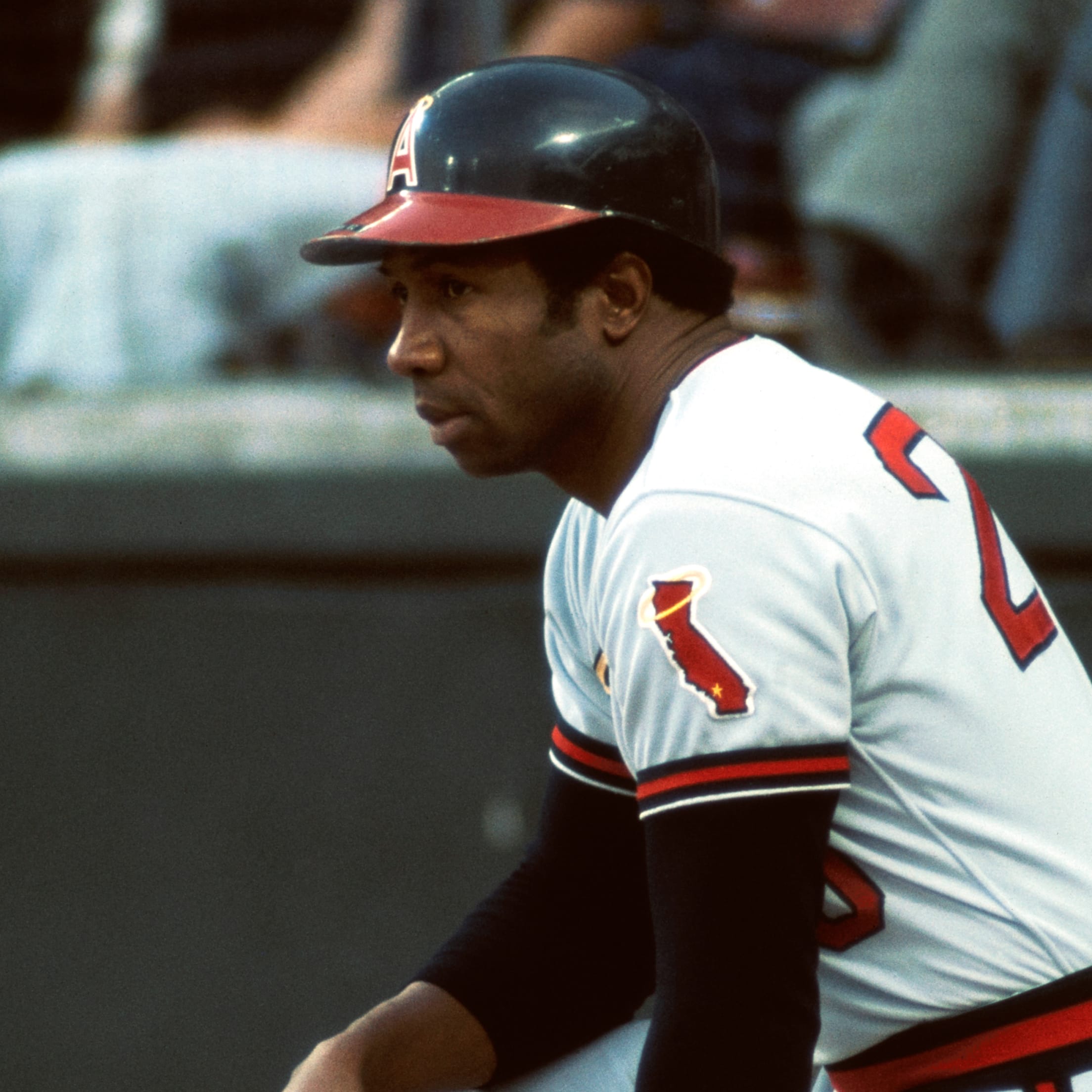
Frank Robinson entered the Hall of Fame in 1982, six years after concluding his career as a player. Robinson played with the Angels from 1973 - 74. He homered in his first at-bat as an Angel on April 6, 1973 and was selected to represent the club as an All-Star in 1974. During Robinson's career, he was a 12-time All-Star, took home the World Series MVP honors in 1966, and was the All-Star Game MVP award recipient in 1971. He was the first player in major league history to win the MVP Award in both leagues. Robinson continued his career in baseball as a manager, a role he had until 2006. He was the first African-American to manage a major league club and was named American League Manager of the Year in 1989.
Nolan Ryan, P
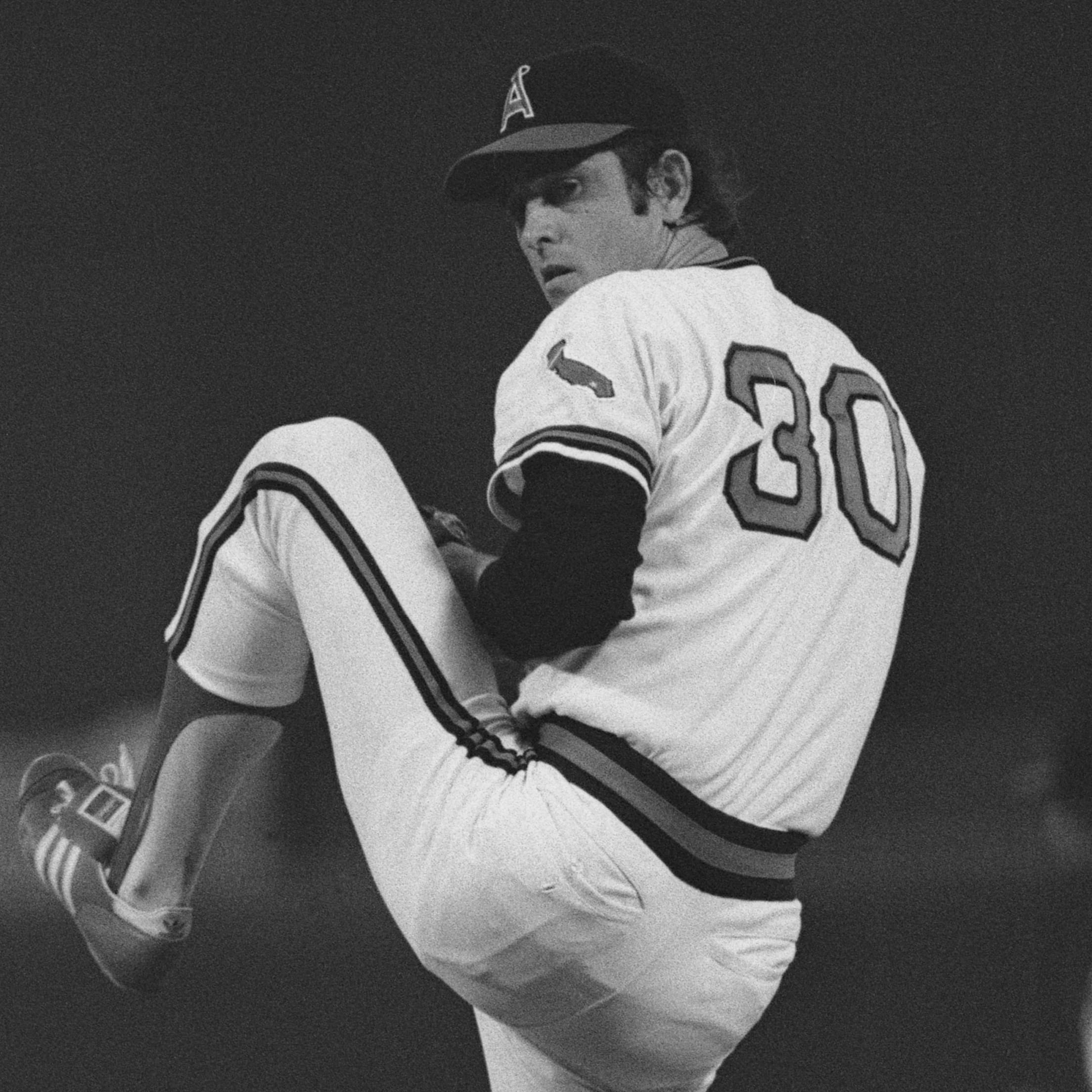
Nolan Ryan appeared with the Angels from 1972-79, compiling a 138-121 record and 3.06 ERA in 291 games. Ryan tossed four of his no-hitters with the Angels and holds or shares several club records, including career wins, complete games (156), shutouts (40) and strikeouts (2,416). In 1977, he was selected "A.L. Pitcher of the Year" by The Sporting News and named to its All-Star team. In 1973, Ryan established a major league record for strikeouts in a single season with 383. He was originally acquired by California, Dec. 10, 1971, along with pitcher Don Rose, outfielder Leroy Stanton and catcher Francisco Estrada in exchange for Jim Fregosi.
Lee Smith, P
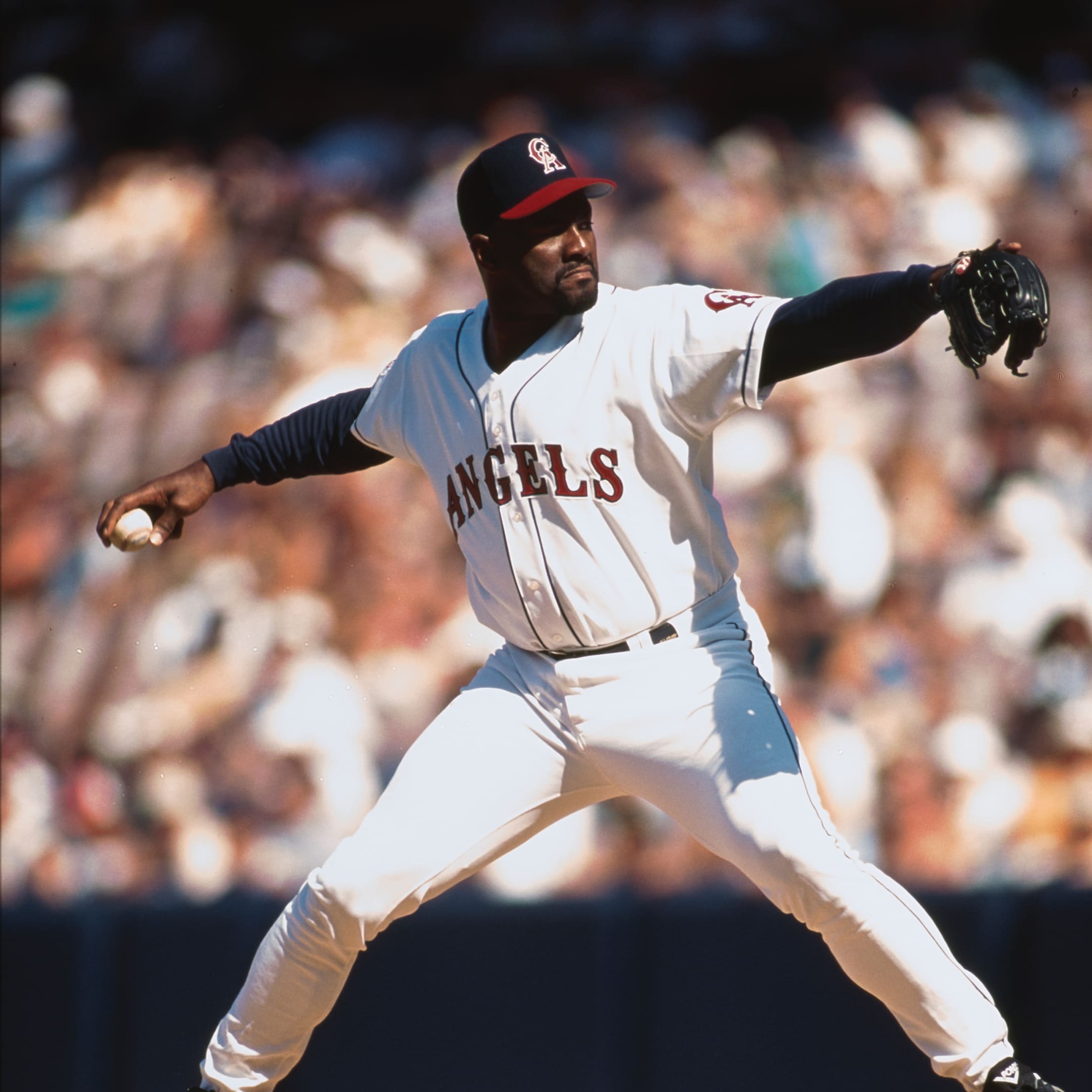
Lee Smith played parts of two seasons (1995-96) with the Angels during his 18-year Hall of Fame career. He tallied 37 saves for the Angels during the 1995 season, which ranked third in the American League. He set the Major League record for career saves in 1993 and his 478 saves remained the all-time record until 2006. The seven-time All-Star was also the all-time leader in games finished (802) when he retired and remains the Cubs all-time leader in saves. He currently ranks third on both the saves and games finished lists with only Hall of Famers Mariano Rivera and Trevor Hoffman ahead of him. Smith retired in 1998 and was selected to the Hall of Fame by the Veteran¡¯s Committee in 2019.
Don Sutton, P
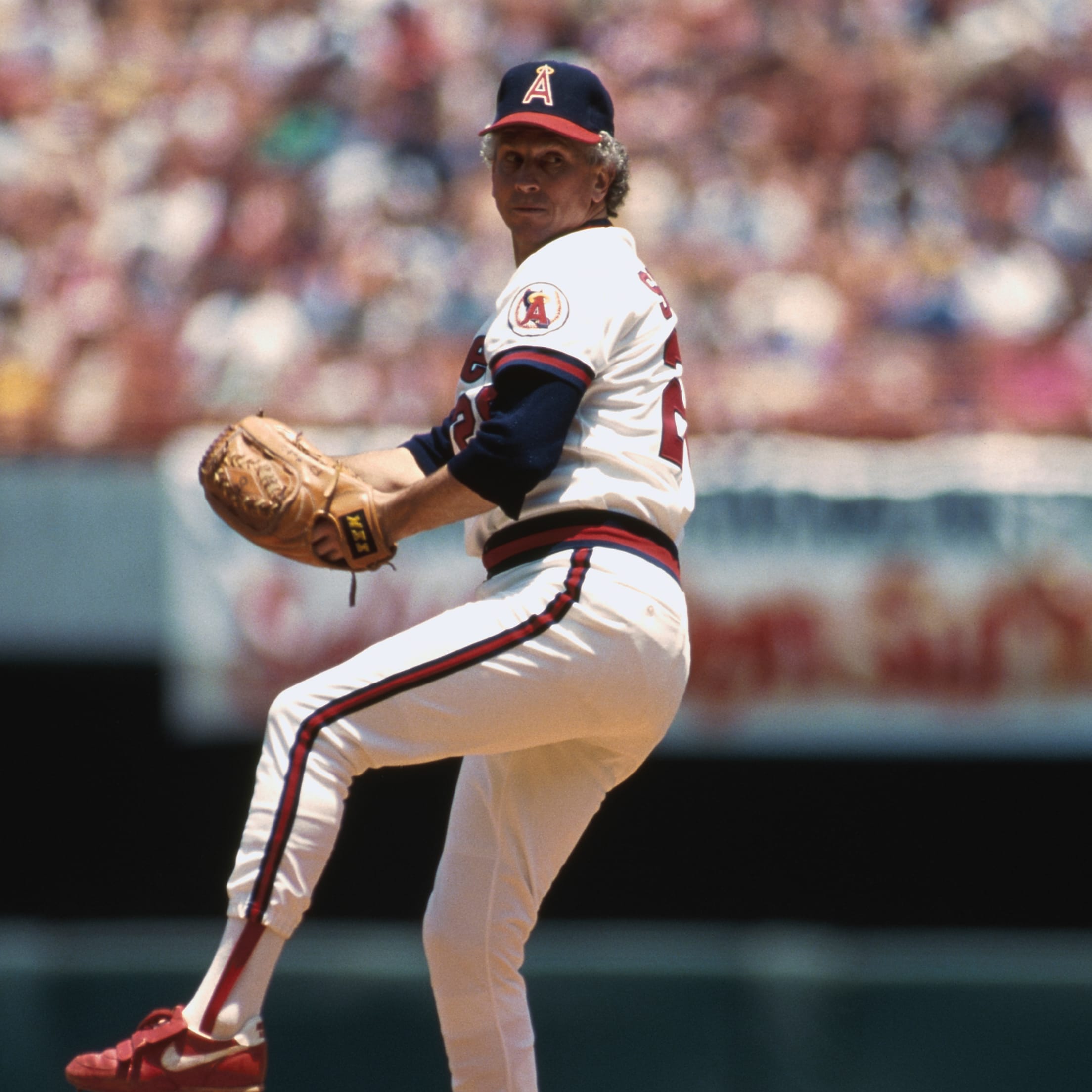
Don Sutton's career lasted more than 20 years, with his time as an Angels coming at the conclusion of his span in the major leagues. He played for the Angels from 1985-87, and was inducted into Cooperstown in 1998. Sutton went 324-256 and struck out 3,574 batters. His winning percentage is 10th best all-time and he has the seventh most strikeouts. He also ranks in the top-10 in multiple categories, including shutouts and games started. While pitching for the Angels, Sutton won his 300th game on June 18th, 1986.
Hoyt Wilhelm, P
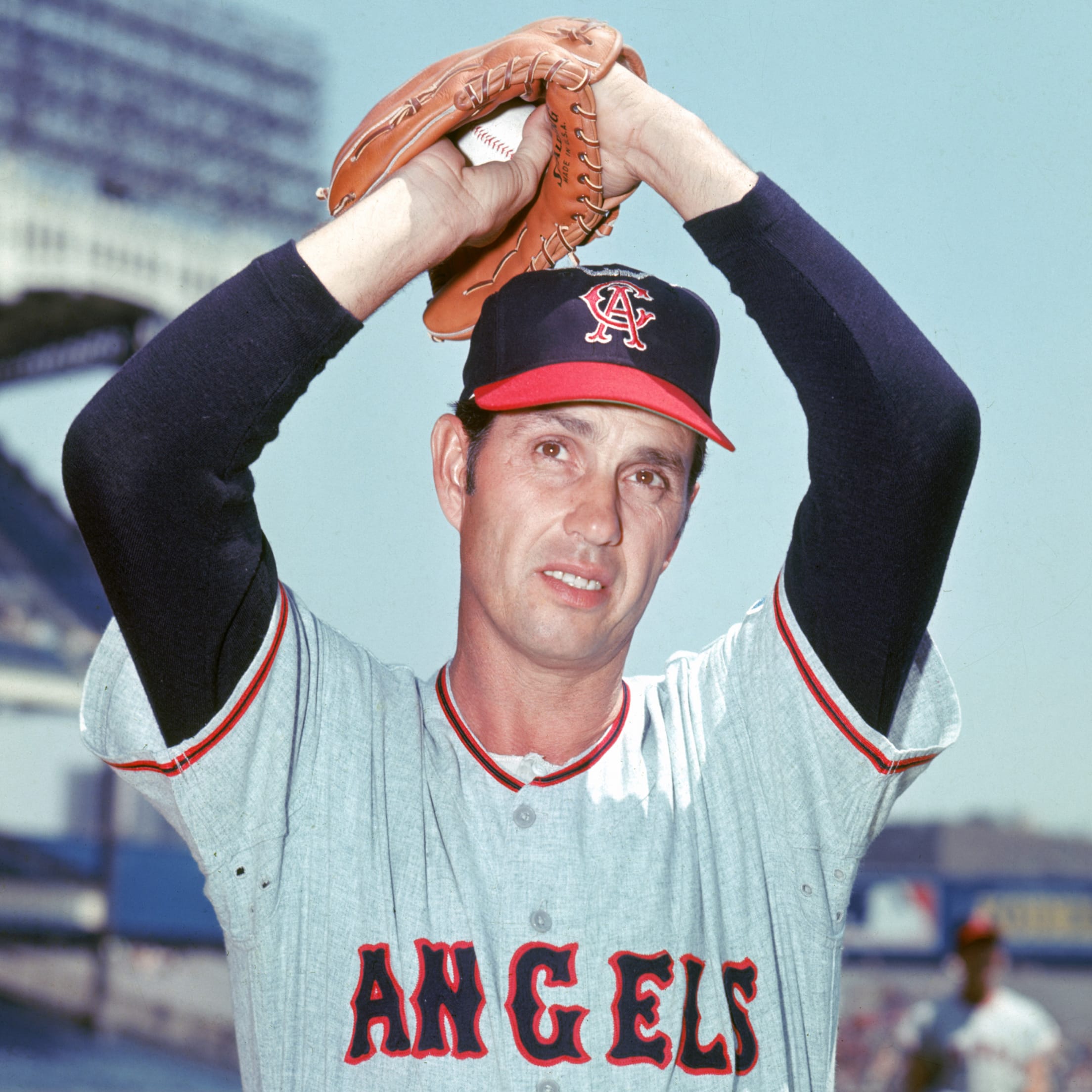
Hoyt Wilhelm was inducted into the Hall of Fame in 1985, having retired following the 1972 season. Wilhelm pitched for the Angels in 1969, at the age of 47. Wilhelm was the oldest player in the league from 1966 through the end of his career. Previous to his big league career, Wilhelm served in the Army during World War II. He was struck in the back and right hand by shrapnel from a German artillery blast. He later received the Purple Heart for his service, and pitched his entire career with that metal piece lodged in his back. His career numbers include 5 shutouts, 20 complete games, 227 saves, 1,610 strikeouts, and an ERA of 2.52. ?
Dick Williams, Manager
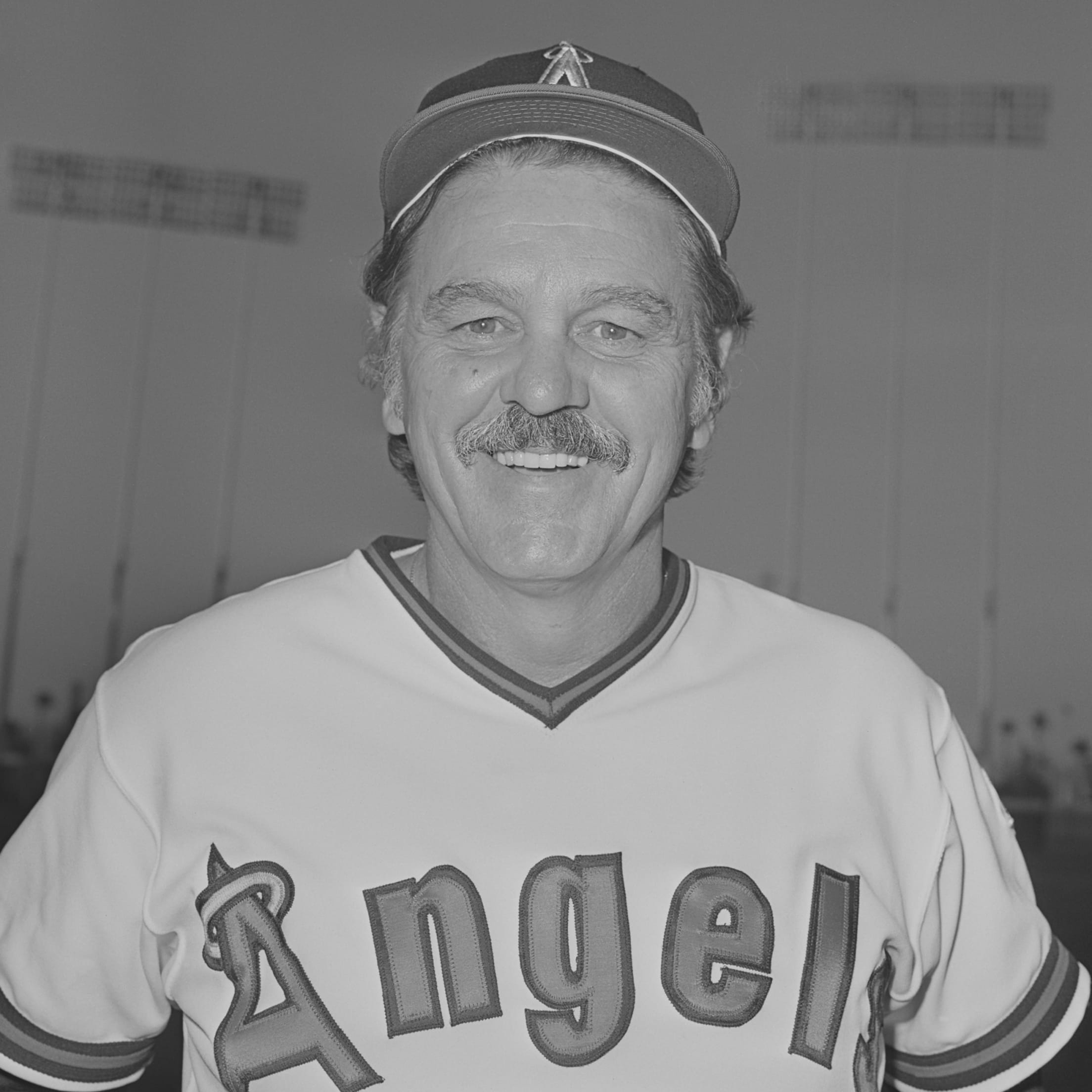
Dick Williams served as the Angels' Manager from 1974-76. During his time with the team, he was an All-Star selection as a manager in 1974. He managed six different teams, having won two straight World Series championships with the Oakland Athletics. Williams saw 3,023 games as a manager in the major league. He has 1,571 career wins and 1,451 losses, with a winning percentage of .520. Williams was inducted into the Hall of Fame in 2008.
Dave Winfield, OF
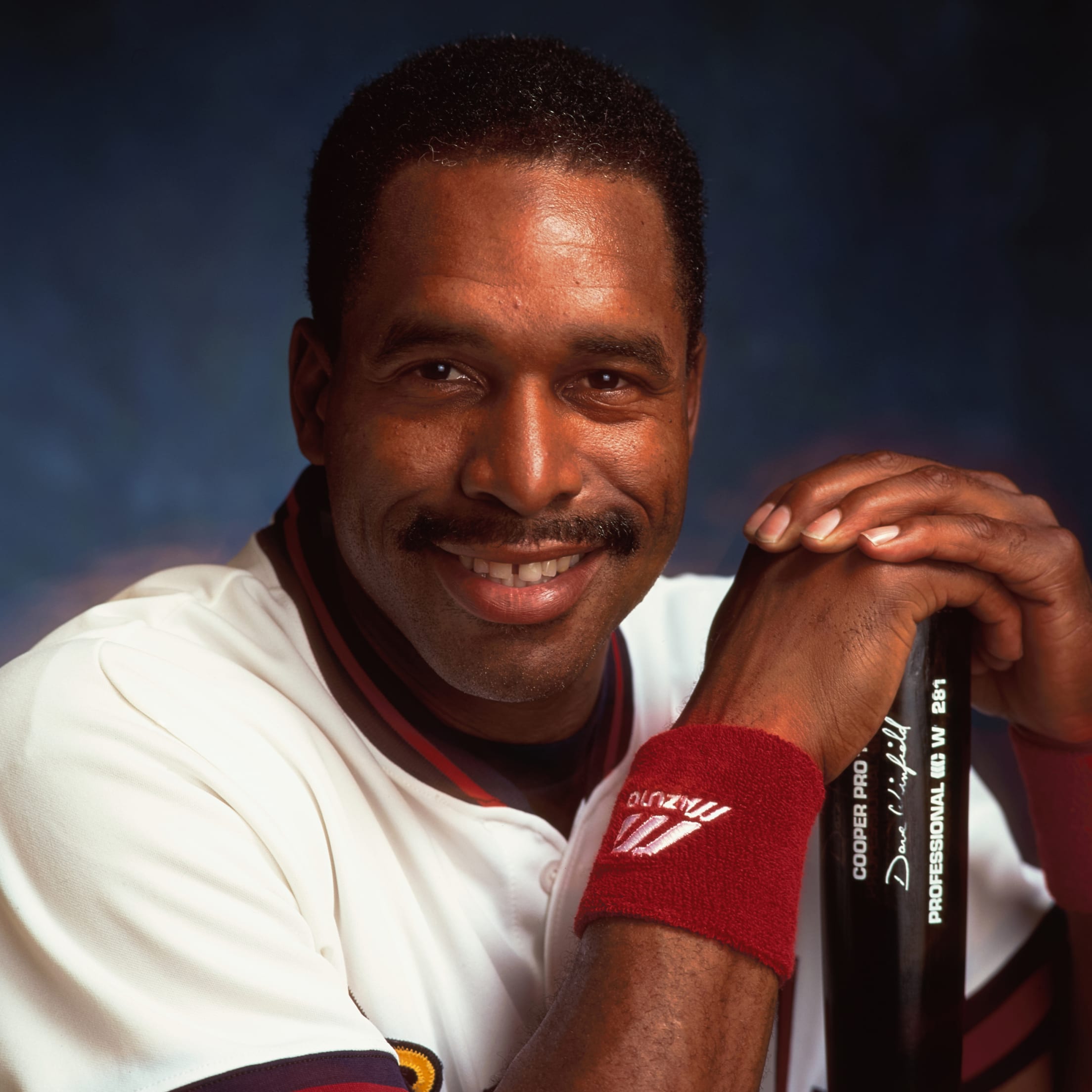
Dave Winfield was a 12-time All-Star selection who amassed 3,110 hits, 465 home runs, and 1,833 RBI. Winfield played for the club from 1990-91. While with the Angels, he became the oldest player to hit for the cycle at the age of 40. In 1990, he was named A.L. Comeback Player of the Year. His career totals include 465 home runs, 223 stolen bases, 1,833 RBI, and 3,110 hits. He was inducted into the Hall of Fame in 2001.
